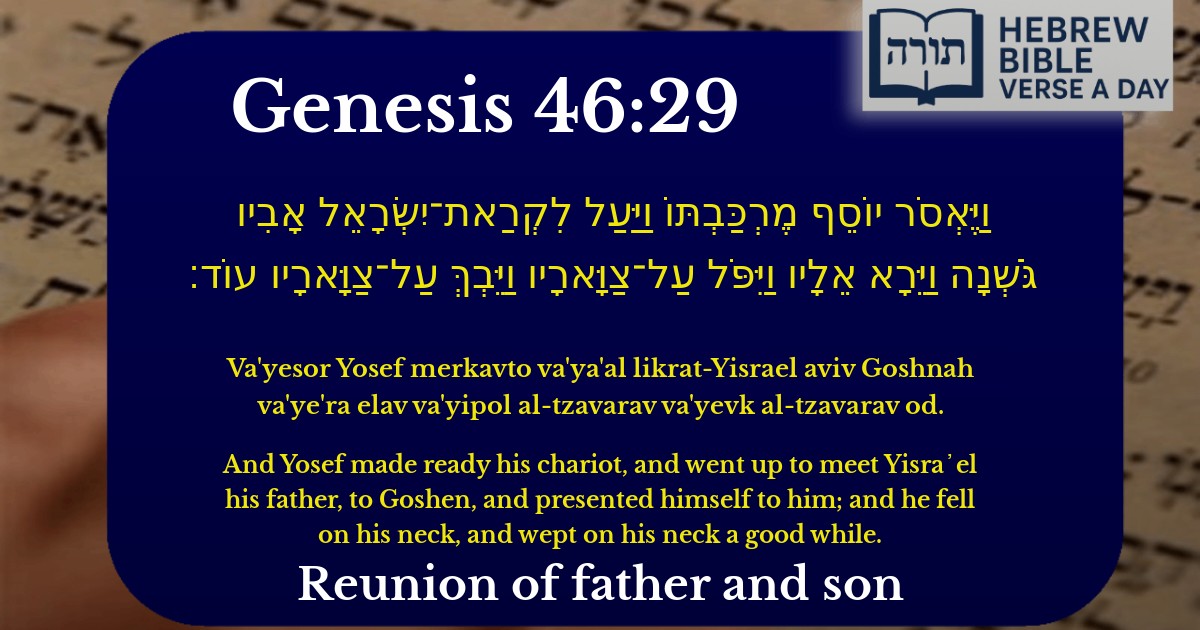Join Our Newsletter To Be Informed When New Videos Are Posted
Join the thousands of fellow Studends who rely on our videos to learn how to read the bible in Hebrew for free!
Hebrew Text
וַיֶּאְסֹר יוֹסֵף מֶרְכַּבְתּוֹ וַיַּעַל לִקְרַאת־יִשְׂרָאֵל אָבִיו גֹּשְׁנָה וַיֵּרָא אֵלָיו וַיִּפֹּל עַל־צַוָּארָיו וַיֵּבְךְּ עַל־צַוָּארָיו עוֹד׃
English Translation
And Yosef made ready his chariot, and went up to meet Yisra᾽el his father, to Goshen, and presented himself to him; and he fell on his neck, and wept on his neck a good while.
Transliteration
Va'yesor Yosef merkavto va'ya'al likrat-Yisrael aviv Goshnah va'ye'ra elav va'yipol al-tzavarav va'yevk al-tzavarav od.
Hebrew Leining Text
וַיֶּאְסֹ֤ר יוֹסֵף֙ מֶרְכַּבְתּ֔וֹ וַיַּ֛עַל לִקְרַֽאת־יִשְׂרָאֵ֥ל אָבִ֖יו גֹּ֑שְׁנָה וַיֵּרָ֣א אֵלָ֗יו וַיִּפֹּל֙ עַל־צַוָּארָ֔יו וַיֵּ֥בְךְּ עַל־צַוָּארָ֖יו עֽוֹד׃
וַיֶּאְסֹ֤ר יוֹסֵף֙ מֶרְכַּבְתּ֔וֹ וַיַּ֛עַל לִקְרַֽאת־יִשְׂרָאֵ֥ל אָבִ֖יו גֹּ֑שְׁנָה וַיֵּרָ֣א אֵלָ֗יו וַיִּפֹּל֙ עַל־צַוָּארָ֔יו וַיֵּ֥בְךְּ עַל־צַוָּארָ֖יו עֽוֹד׃
🎵 Listen to leining
Parasha Commentary
📚 Talmud Citations
This verse is quoted in the Talmud.
📖 Sotah 36b
The verse is referenced in the context of discussing Joseph's reunion with his father Jacob, highlighting the emotional depth and significance of the moment.
📖 Megillah 16b
The verse is mentioned in a discussion about the proper way to interpret biblical narratives, particularly focusing on the actions and emotions of biblical figures.


Yosef's Emotional Reunion with Yaakov
The verse describes Yosef's emotional reunion with his father Yaakov after many years of separation. Rashi (Bereshit 46:29) explains that Yosef "fell on his neck" as an expression of overwhelming emotion, but notably, the Torah does not state that Yaakov reciprocated by embracing Yosef. This leads to several interpretations in Chazal:
The Significance of Goshen
The meeting takes place in Goshen, which Rashi (Bereshit 46:28) notes was chosen deliberately as the most suitable place for Yaakov's family to settle - separate from Egyptian society yet fertile enough to sustain their flocks. This maintained their distinct identity while providing material needs.
Yosef's Chariot Preparation
The verse begins by noting Yosef prepared his chariot. The Kli Yakar (Bereshit 46:29) explains this demonstrates Yosef's respect for his father - he didn't send servants but personally prepared his royal transportation to honor Yaakov. This fulfills the mitzvah of kibud av even while serving as Egypt's viceroy.